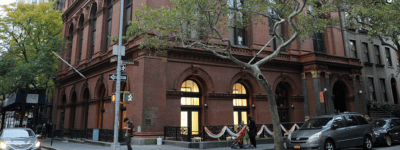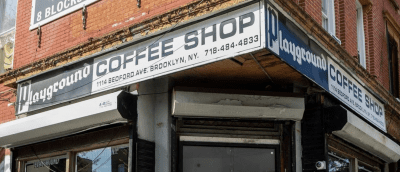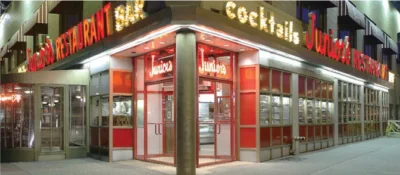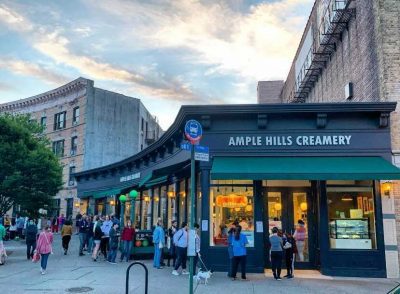Running to Protest dashes across the Manhattan Bridge, led by co-Founders Coffey, right, and Power Malu on November 21, 2021. (Photo: Gary Dean Clarke)
‘We’re not gonna stop’: Lacing up for activism and education
Jogging with Coffey, the Fort Greene filmmaker-activist behind Running to Protest and Define New York
Coffey is standing on the corner of Adelphi Street and Myrtle Avenue, addressing a group of some 50 fellow runners. He has just led them—all volunteers—in a morning of restocking various community refrigerators along a three-mile route stretching from Manhattan to Brooklyn in order to bring awareness to food scarcity and mutual aid.
Here, he stops to inspect a fully-stocked community fridge flanked by Fort Greene’s ornate brownstones. The filmmaker, actor, activist and runner likes what he sees—and promises more. “We’re not gonna stop,” he tells Brooklyn Magazine.
The gathering is the latest community organizing event by Running to Protest, a group that Coffey (who only goes by his last name) convenes monthly with co-founder Power Malu. And although it’s smaller than some of the events he ran in warmer months, he doesn’t seem phased.
“One, two, 2,500 people. As long as we know we’re doing what’s right, then that’s how I know I’m able to go home and sleep,” he says.
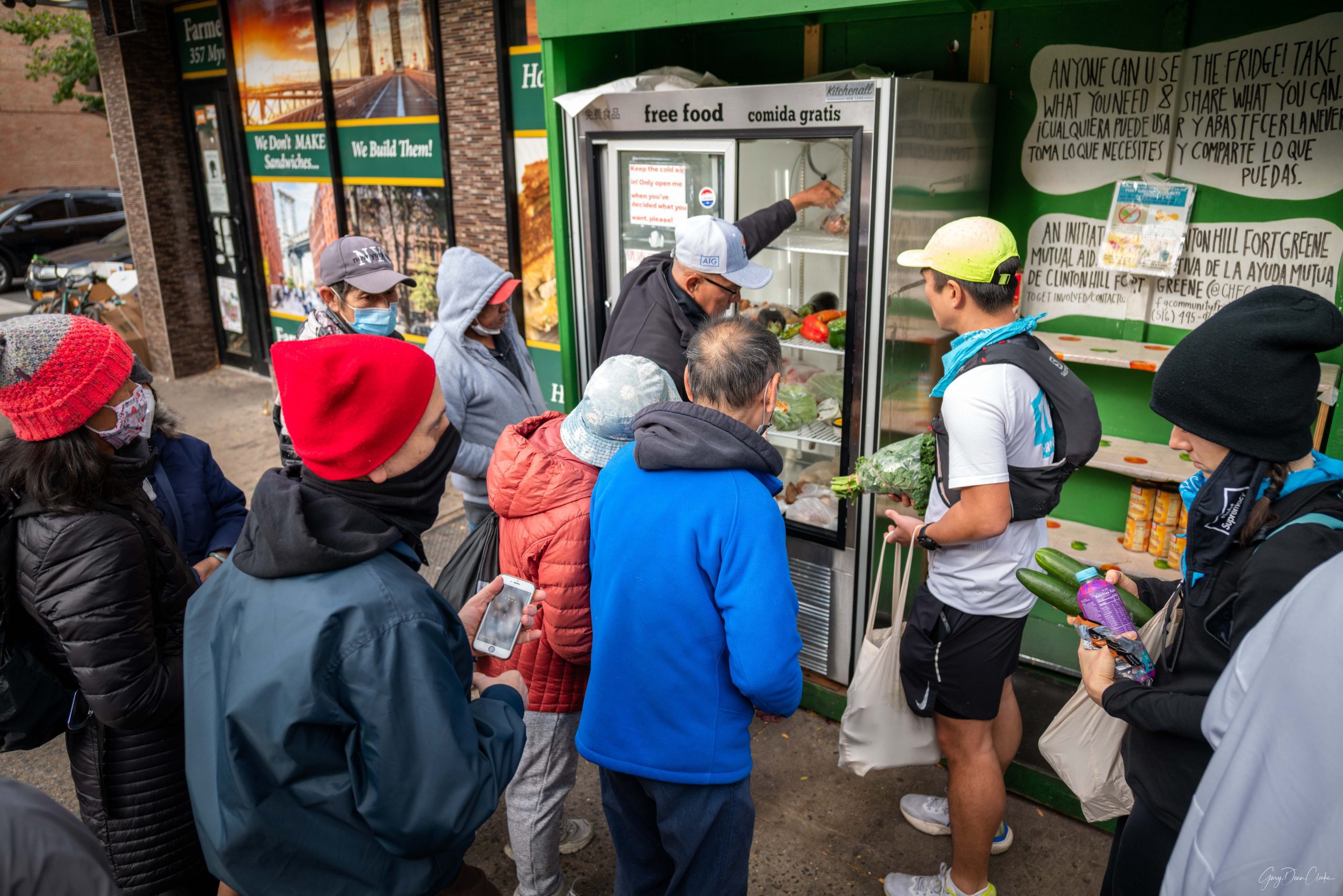
Running to Protest fills a community fridge in Fort Greene Park on November 21, 2021. (Photo: Gary Dean Clarke)
Running to Protest shot out of the starting block in June 2020, during that summer’s Black Lives Matter protests. Coffey leveraged his personal passion for running (and inclusivity in running) to organize his own series of demonstrations: runs through Brooklyn and Manhattan to raise awareness of injustice and inequality. Coffey and Malu organize a new run every month, centered around a different social justice issue, drawing widespread attention and attracting thousands of attendees in the process.
Running to Protest’s food scarcity and mutual aid event on Sunday—only hours after the Kyle Rittenhouse verdict was handed down some 700 miles away—is just the latest natural extension of the ethos that got them pounding the pavement for change in the first place.
“I believe that on a local level is where real change happens, and then hopefully those ripple effects will create waves to break down a system,” Malu notes. “You’ll go crazy trying to figure out why things [in this country] are the way they are. So do it on a local level. Show people how important it is to build community.”
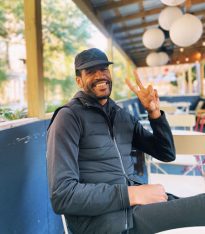

Coffey (Kellen Bulger)
Define New York
Running to Protest is actually Coffey’s second running club, launched during a summer of turmoil after he had gained some traction with another club, called Define New York, which he started earlier in the year. Where the focus of Running to Protest is about activism and engagement, Define New York was created with a more educational orientation: Coffey organizes runs to landmarks in Brooklyn where the group stops to discuss the historical significance of various spots throughout the borough.
The Define New York crew has made informative stops at the old site of Ebbets Field, the Bushwick murals, and other spots a typical New York City runner might not usually see: Coffey’s runs are often to areas of the city that are located in poorer, non-white neighborhoods. (While Define New York and Running to Protest are technically two different clubs, many of the same runners attend events for both.)
“If I didn’t take them… they would’ve gone their entire life without knowing about that [side of the city],” Coffey says. “That excites me to want to continue to find these nuances, or these hidden gems that nobody knows about.”
It excites the runners too. Cheryl Mark, a member of Define New York and resident of Brooklyn Heights, says she leaves every session feeling grateful.
“I know more about areas of Brooklyn, the history there, the businesses there because of them,” she says.
Coffey’s running crew is open to athletes of any fitness level and any racial, ethnic or gender identity, which isn’t always the case. New York City has nearly 100 officially recognized running clubs and the world’s largest marathon. But when it comes to diversity and representation… there’s still progress to be made.
“Obviously, there’s a lot of run clubs that are strictly 100 percent white. Any person of color, they would probably be afraid to even ask if they could be a part of that club,” says Coffey.
He’s trying to change that—and encourages others to do the same. “Don’t be afraid to invite people into your club regardless of what color, or what speed they may be running,” he says. After all, you don’t have to run fast to help stock a community fridge.
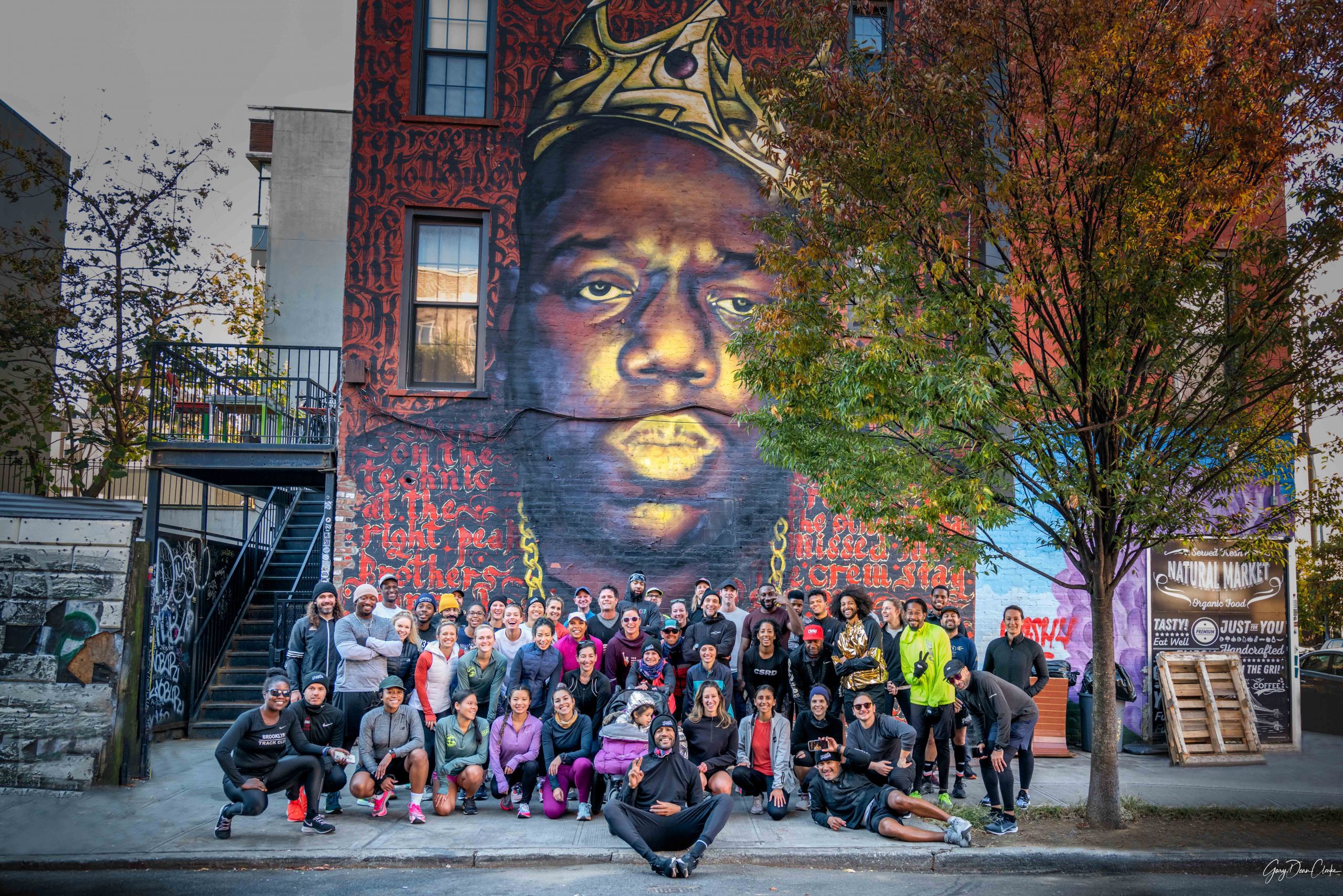

Define New York in front of a mural of native son Biggie Smalls (Photo: Gary Dean Clarke)
Define New York often meets on Thursday evenings for a workout like hill repeats and every Saturday for a long run that starts in Fort Greene. Running to Protest has a monthly Zoom call where the group’s leaders discuss what social justice issue to organize around next.
You might also like 

















